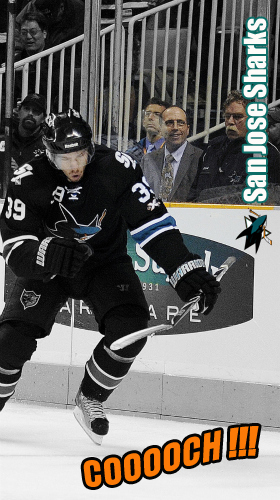Monthly Archives: September 2014
In remembrance of San Jose Sharks prospect Daniil Sobchenko
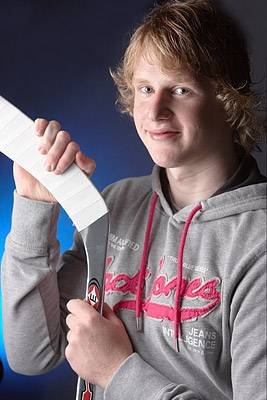 As I awoke on the morning of Sept. 7, 2011, I reached for my phone to see what was new on my Twitter timeline. At the top of my timeline were tweets about a plane crash involving an entire hockey team. Immediately, I grabbed the remote and turned the television on to ESPN, whom had images of a plane crash with a “Breaking News” graphic.
As I awoke on the morning of Sept. 7, 2011, I reached for my phone to see what was new on my Twitter timeline. At the top of my timeline were tweets about a plane crash involving an entire hockey team. Immediately, I grabbed the remote and turned the television on to ESPN, whom had images of a plane crash with a “Breaking News” graphic.
Within seconds of having the television on ESPN, I heard the SportsCenter anchor say, “In case you’re just joining us, a Russian jet carrying the Yaroslavl Lokomotiv hockey team of the Kontinental Hockey League (KHL) has crashed, killing 43 on board.” After hearing and seeing what had happened, I said out loud, “Yaroslavl Lokomotiv?… Isn’t that the team San Jose Sharks draftee Daniil Sobchenko plays for?”
GROWING UP
Born in Kyiv on April 13, 1991, Sobchenko began playing hockey by accident when at age six, his father (and first coach) Yevgeny Sobchenko asked him if he wanted to come along as he was going to play hockey with friends, to which Daniil replied, “of course, let’s go!”
Under the guidance of his father, Daniil was enrolled at the Sokil Kyiv‘s hockey school and competed against older children while playing for the local youth teams “Icicle”, “Falcon” and “Orbit”. At age 10, Daniil, who modeled his game after his hockey hero Sergei Fedorov, finished as the leading scorer in a youth tournament and his hockey talents were noticed by Yaroslavl.
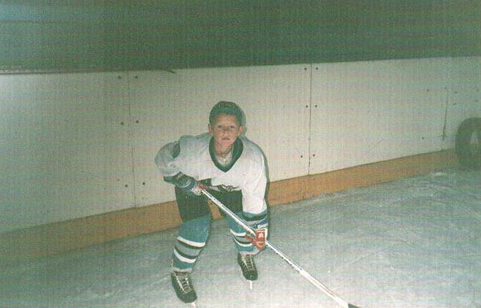
“Immediately, they called me at home and invited me to play in Yaroslavl,” said Daniil in a 2010 interview with Alessandro Seren Rosso for sports-planet.ru. “But my parents told me I had to stay home for another year.”
A year later, Daniil was asked by Spartak-90 to attend their July training camp in Moscow. A few days later, Daniil received a call from Yaroslavl and was asked to tryout for their 91-team. Having to make a tough choice, Daniil said goodbye to his childhood and hello to adulthood as he decided to go play for Lokomotiv due to a couple of coaches being there from Kyiv and not having many options for hockey in his hometown.
“At first, it was a bit hard, but then I got use to everything and everything was alright,” said Daniil.
Joining Lokomotiv-1991 in 2002 as a fifth grader, Daniil helped the team win multiple silver and bronze medals in various tournaments throughout Russia over the next five years. Not only was Daniil excelling on the ice, he was also excelling academically by showing the same commitment to his grades as he did his hockey game, evident by him sitting in the front of row of classes and rigorously studying, even when having break time.
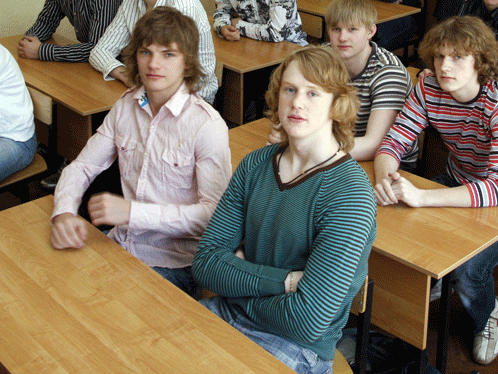
“From the outset, Daniil set a goal – to achieve great results,” said Yaroslavl school number 9 sports class headmistress Elvira Ozimova in a Sept. 2011 interview with Michael Kontuev and Elena Zaitseva for the Yaroslavl Komsomolskaya Pravda website.
Though Daniil did get into a fight at school that went on the record, it was that moment that caused Daniil to realize he had to behave more reasonable in difficult situations. “Daniil could fight but he wasn’t a bully,” said Ozimova. “He, as a man, knew how to stand up for himself and for loved ones.”
Not afraid to take a leadership role on the team and speak up when something needed to be said, Daniil showed the same leadership inside the classroom by making a simple comment to quiet classmates if they were distracting the class by talking or acting up.
Confident knowing he was following his life goal, Daniil was ready to embark on the next chapter of his hockey career.
KHL BOUND
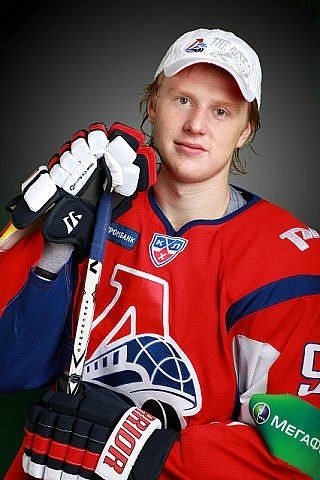 In his first season (2007-08) with Lokomotiv’s junior farm team, Lokomotiv-2, 16-year old Daniil registered 13 points on six goals and seven assists in 22 games. Furthermore, Daniil skated for Russia at the 2007 U17 World Hockey Challenge, where he registered four points on three goals and one assist in four games.
In his first season (2007-08) with Lokomotiv’s junior farm team, Lokomotiv-2, 16-year old Daniil registered 13 points on six goals and seven assists in 22 games. Furthermore, Daniil skated for Russia at the 2007 U17 World Hockey Challenge, where he registered four points on three goals and one assist in four games.
The following season, 2008-09, Daniil torched the third tier league for 87 points on 44 goals and 43 assists to go along with 53 penalty minutes in 66 games.
Expected to become a star of the Russian Minor Hockey League (MHL), the relatively unknown playmaking center sent shock-waves throughout the Russian hockey realm when he earned a spot on Lokomotiv’s KHL team for the 2009-10 season after a solid preseason effort.
“I think there is nothing unexpected,” said Daniil. “Yes, it is quite possible that I could play in the MHL and show good results there, but you need to grow, progress and strive to play at the highest level. However, I am glad to play for our youth team and am ready to help them.”
In 35 games with Lokomotiv’s KHL team, Daniil registered six points on five goals and one assist, and had four assists in six games for Lokomotiv’s MHL team, Loko Yaroslavl.
The 2010-11 season saw Daniil split time between Lokomotiv’s KHL team, where he registered two points on one goal and one assist in 16 games, and Loko Yaroslavl, where he registered 20 points on 10 goals and 10 assists in 14 games. Daniil rejoined Lokomotiv for their KHL playoff run and had one assist and 16 penalty minutes in 11 games.
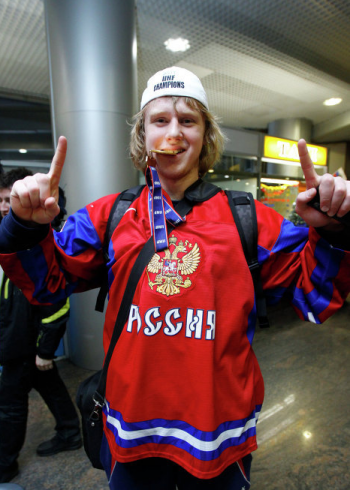 In addition to playing for both Lokomotiv teams during the 2010-11 season, Daniil was the captain of the Russian Selects squad that achieved their first series win over the Canadian Hockey League (CHL) All-Stars at the 2010 Subway Super Series, and helped Russia win the Gold medal at the 2011 World Junior Ice Hockey Championships.
In addition to playing for both Lokomotiv teams during the 2010-11 season, Daniil was the captain of the Russian Selects squad that achieved their first series win over the Canadian Hockey League (CHL) All-Stars at the 2010 Subway Super Series, and helped Russia win the Gold medal at the 2011 World Junior Ice Hockey Championships.
Having never made the Russian national junior team in past years due to conflicts with former head coach Vladimir Plyuschev, Daniil showcased his talents by registering seven points on four goals and three assists in seven games as he centered the top line alongside Maxim Kitsyn and Vladimir Tarasenko.
Though his skills wowed fans watching the World Junior Championships, the one moment Daniil was best remembered for was when he shouted, “MOM, I DID IT!” into the camera lens after the team’s victory over Canada in the gold medal game. In fact, Daniil didn’t take his medal or jersey off for several days following the win, to which some teammates joked Daniil was getting “star fever”. However, Daniil didn’t care. He felt on top of the world and was ready to conquer new challenges.
SUMMER 2011
As a result of being a key component to Russia’s gold medal team at the World Junior Championships, Daniil vaulted himself from unknown name to possible National Hockey League (NHL) draftee.
Liking his playmaking abilities, strong hockey IQ, work ethic, passing and skating game (both with and without the puck), the Sharks selected Daniil with the 166th overall pick in the sixth round of the 2011 NHL Entry Draft. A couple of weeks later, Daniil, who was the Sharks’ first draft pick from a Russian team since defenseman Andrei Zyuzin in 1996, was in San Jose for the Sharks’ rookie development camp.
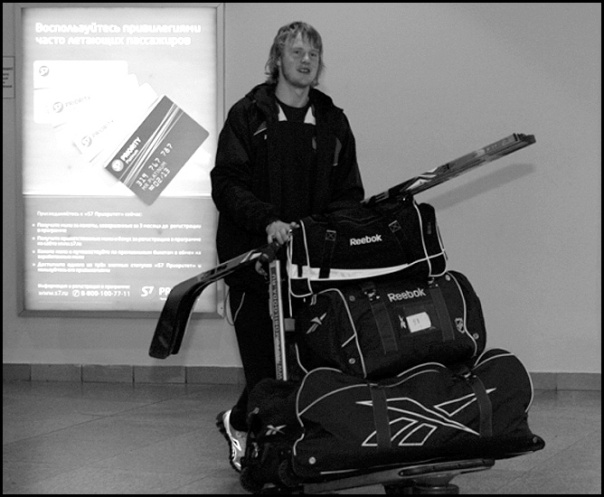
“I had a whole schedule there,” Daniil said in Russian for a Sept. 2011 interview with Rosso for Hockeysfuture.com. “I had to get up at 6 AM as at 6:45 we had to go to the practices. There, we had both breakfast and lunch. And I would get back to the hotel only at 6 PM. We had two ice sessions a day, some gym, and two or three summits every day.
“The practices were varied, there was always something new. I learned many new things. And I also want to add that the organization here, it’s truly superior (to the KHL).”
While his hockey skills spoke volumes at Sharks development camp that week, Daniil told Rosso the English language was a hurdle he had to overcome. “It’s when you don’t understand everything they say, but it was a little bit better day after day. But I always managed to do all the drills, I also could look at what other players were doing. Summits were hard, I had to sit there and just listen for two to three hours per day.”
After Sharks development camp ended, Daniil returned home to Yaroslavl and began preparing for Lokomotiv’s 2011-12 KHL season opener against Dinamo Minsk.
THE CRASH
On Sept. 7, 2011, the Lokomotiv hockey team, coaching staff and several prospect players boarded a Soviet-era Yakovlev Yak-42 passenger aircraft from Yak-Service to travel to Minsk, the capital of Belarus, for their season opening game.
Unfortunately, tragedy struck as the plane ran off the near 3,000-meter runway, struck a tower mast about 500 meters from the end of the runway when trying to gain altitude from on the grass field and crashed into the banks of the Volga River about 1.2 miles from Tunoshna Airport.
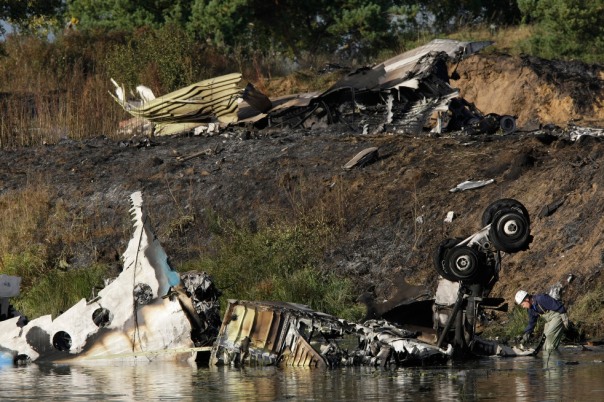
Of the 45 people on the flight, 43 died at the scene. Lokomotiv forward Alexander Galimov was put into a medically induced coma after suffering burns on 80 percent of his body and died five days later. Only the flight mechanic, Alexander Sizov, who was also put into a medically induced coma, survived.
Among those who perished in the crash were Daniil, former NHL players Pavol Demitra, Ruslan Salei, Josef Vasicek, Karel Rachunek, Jan Marek, Alexander Vasyunov, Karlis Skrastins, Stefan Liv, and coaches Brad McCrimmon, Alexander Karpovtsev, and Igor Korolev.
There were a handful of factors that contributed to the crash, all of which were chronicled in the investigation report that was released two months after the crash, and highlighted in a Jan. 2013 Mayday, aka Air Crash Investigation, documentary on the National Geographic channel.
While First Office Igor Zhevelov, who was the Senior Vice President of Flight Operations for Yak-Service, and Captain Andrei Solomentsev, who was a close friend of Zhevelov, had thousands of hours of flight experience, the duo weren’t properly trained to fly the Yak-42 aircraft as Zhevelov had not completed his Yak-42 training program and Solomentsev was using falsified documents.
Records showed Zhevelov logged 12,879 hours flying Yak-40’s compared to 613 hours flying Yak-42’s, and Solomentsev logged 4,692 hours flying Yak-40’s compared to 1,525 hours flying Yak-42’s. In addition, Zhivelov pulled rank so he could fly with his “hockey heroes.”
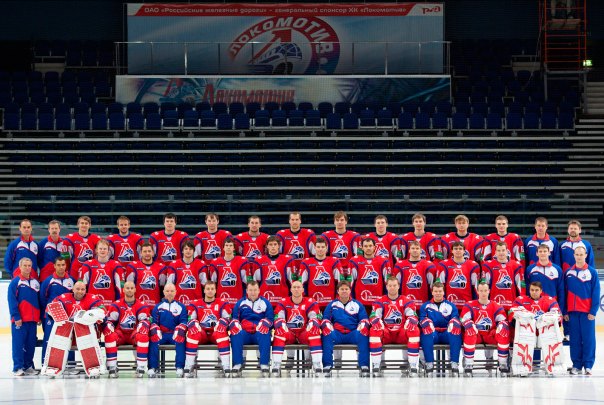
The plane had more than enough speed to ascend properly at the 1200-meters mark on the runway but it was discovered Zhevelov kept his foot on the brake without realizing it (the Yak-40 airplanes brake design cupped the entire foot whereas the Yak-42 airplanes brake design allowed the heel to rest on the floor). Zhevelov’s medical records revealed he had secretly been treated for a nerve condition called Polyneuropathy, a neurological disorder that affects the body’s extremities and causes weakness along with loss of sensation.
When the plane ran off the runway at 220 kph (136.7 mph), captain Solomentsev moved the controls to abort the takeoff. Upon seeing this action, flight engineer Vladimir Matyushin, who was the third man in the cockpit, decreased engine power by putting the engines in neutral. However, Zhevelov disagreed and Solomentsev reversed his decision, ordering Matyushin to put the engines up to full power for a takeoff attempt.
“Had they rejected takeoff three-to-five seconds after attempting to rotate, they would’ve still stopped on the clearway and everybody would’ve just walked away,” said JAKA-42 pilot Wiktor Jermolajew in the documentary.
In the wake of the crash, Yak-Service had their license revoked by Russia’s Federal Air Transport Agency, aka Rosaviatsia, and went out of business shortly thereafter. Furthermore, the airlines former vice president, Vadim Timofeev, was charged in connection with the crash one-year later for allowing the unqualified crew to illegally fly the Yak-42 instead of having the crew attend their scheduled re-education sessions to gain the proper permits to fly a Yak-42.
REACTIONS
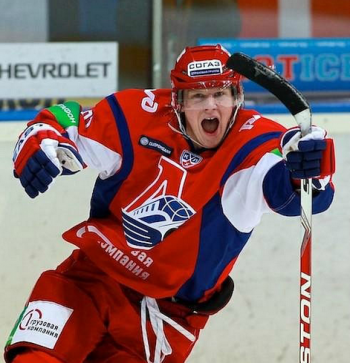 With tears trickling down their cheeks, hockey fans and players around the world took to social media to send their thoughts, prayers and condolences to those who had just lost a loved one.
With tears trickling down their cheeks, hockey fans and players around the world took to social media to send their thoughts, prayers and condolences to those who had just lost a loved one.
Members of the Sharks organization recalled Daniil’s time in San Jose as he left a lasting impression with those he had came in contact with.
“Daniil attended our development camp this past July and everyone on our staff agreed that he had a bright future with our organization,” said Sharks Executive Vice President and General Manager Doug Wilson in a statement on the Sharks website in the hours after the plane crash. “He was an amazing person with a fun-loving personality and his attitude and energy during his time in San Jose was infectious.”
“For him, it took a lot of courage to come here as a young player and basically speak no English,” said Sharks head coach Todd McLellan of Daniil to the Mercury News’ David Pollak the day of the crash. “But he fit in really well. He had an energy about him. We really liked him as a player. We had actually hoped he would commit to playing in Worcester this year.”
Sharks forward Tommy Wingels, who was Daniil’s roommate during development camp, revealed to Pollak that the Sharks’ scouting staff and Daniil’s girlfriend, whom Daniil spoke to via Skype, were pushing Daniil to learn English.
“At times, it was tough for him to understand some of the coaching points, but talent-wise, he was one of the best,” said Wingels to Pollak. “He skated well, he could shoot the puck.”
Over in Minsk, the game’s organizers arranged a requiem mass at Minsk-Arena the following night (Sept. 8, 2011) in one of the most respectful and classiest tributes in sports history.
Though tickets had been sold long in advance of the game, not one ticket holder asked for a refund as the ceremony was held inside a packed Minsk-Arena full of mourning fans, each of whom had brought flowers. Also in attendance was the entire Belarusian leadership, including President Alexander Lukashenko.
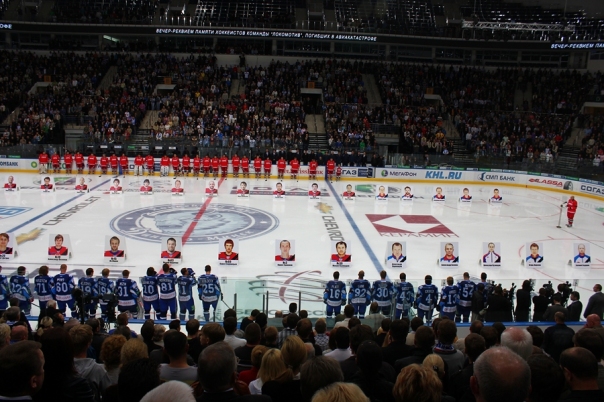
With the orchestra’s voice filling the arena, the Dinamo Minsk players skated onto the ice, individually took a knee behind one of the 37 large portraits of the deceased Lokomotiv players and staff, and proceeded to guide the puck at each portrait into their own net to symbolize a defeat to Lokomotiv. At the other end of the ice, members of the Belarusian national hockey team laid flowers inside the goal crease in Lokomotiv’s memory.
As family, friends and significant others did their best to cope with the loss of their loved ones, Daniil’s younger brother Ilya dealt with the tragedy in his own way that was highlighted on a translated tumblr posting by user “aether-wings“:
“The younger brother of Daniil Sobchenko, 6-year old Ilya, took the incident in his own way, much as a child. He knows that his beloved Daniil was killed, as I know my brother is still out there. A few days ago, he promised his mother and father that when he gets older, he will be a champion, like his Dan. To hold off injury to the psyche of the small boy, the parents told him that Daniil is now among the stars in the sky, to watch over them all.
Yesterday, Ilya went to the balcony and asked me to show that star, who is now Daniil, – My mother Irina said ‘in a shaking voice’ – that the sky was dark and the stars could not be seen. Ilya leaned over to me to say ‘Mom, I want him to hug me again.’ because Dan was always very fond of him. He never came without gifts for the boy. He would never take him on the railway, only in a car. Only the best for his brother. Ilya once told me: ‘There is no Santa Claus, It’s all my brother!’
Now, Ilya’s favorite toy is an airplane, in which the child wrote ‘Yak-42’, and when he plays with it, he tries hard always to hold it tight, not to let it drop, not to let if fall.”
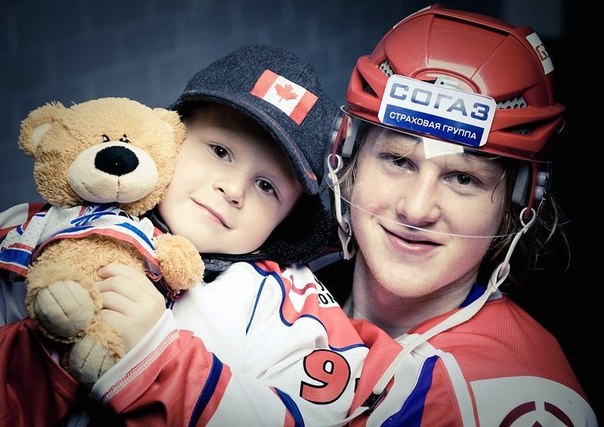
PHOTO CREDITS
bnp.by, fanzone.khl.ru, lokomotiv.info, ria.ru, sports.yahoo.com, sports.ru, yar.kp.ru, vk.com, yarreg.ru, yarsport.ru.
